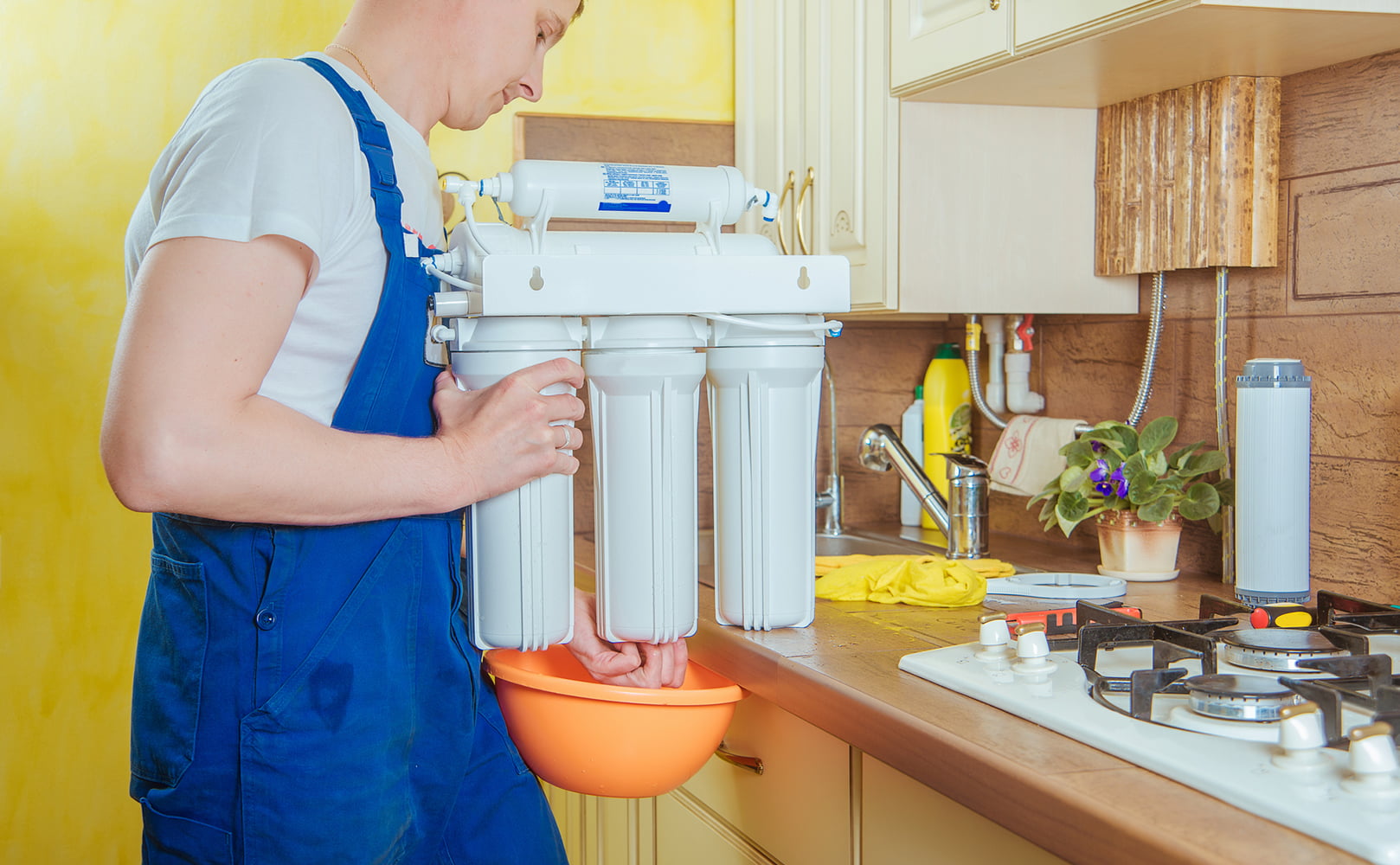Under Sink Water Filters vs Faucet Filters – What’s Better?
Written by: Alexandra Uta // Last Updated: Jan 4, 2023
This page may contain affiliate links. If you buy a product or service through such a link we earn a commission at no extra cost to you. Learn more.
If you’re in the market for a home water filter and want a design that’s as unobtrusive as possible, two of your main choices will usually be under sink filters and faucet filters.
Other options exist as well (like whole house water filters), but they be more expensive or simply not suitable for your home.
This leads us to the question: Under sink water filters vs faucets filters – what’s better?
Key Takeaways
- Compatibility – Under sink water filters are compatible with most sinks by default since they attach to the cold water valve rather than the faucet directly. Faucet filters fit standard faucets only.
- Contaminants – If your water is heavily contaminated, a faucet filter might not suffice. Tip: Have your water tested!
- Water flow and pressure – A faucet water filter may slow down output pressure considerably.
- Durability – Faucet water filters tend to be more fragile in the long run.
- Installation – If you want minimal hassle when installing your water filter, choose a faucet unit.
- Filter Life – Faucet water filters require more frequent filter replacements which adds to the cost.
- Space – Under sink water filters take up more space. But faucet filters may make your sink more awkward to use for certain tasks like washing dishes.
- Costs – Faucet filters are less expensive upfront. A simple under sink filter may be cheaper to maintain.
About Under Sink Water Filters and How They Work
Under sink water filters, as their name implies, are installed under the sink. They attach to your plumbing and purify water before it reaches the faucet. These models take up little space and stay out of your way, making them ideal for smaller households.
Pros
Doesn’t Take Up a Lot of Space
One of the best things about an under sink water filter is that it takes up very little space compared to other filtration systems. Furthermore, the space that it does occupy is typically not actively used for anything other than storing household products like cleaning agents.
Works for Most Homes
An under sink water filter is easy to install in pretty much any home. If you don’t have a lot of space under your sink, you can still go for a single-stage model which should easily fit in your cabinet.
Low Maintenance
You won’t have to do much to keep an under sink water filter running properly most of the time. Most models require relatively infrequent filter replacements, making them very easy to maintain.
Better Filtration on Average
An under sink water filter tends to provide better filtration, especially in cases of more severe contamination. This can make them a preferred choice compared to faucet models for households with significant water contaminant levels.
Wide Range of Options
You can pick from a wider range of options, including multi-stage filters. This can be useful if you’re trying to target specific contaminants or otherwise adapt to unique water conditions that a regular faucet filter might not be ideal for.
Cons
More Expensive
Compared to faucet filters, under sink water filters are more expensive on average. This also includes filter replacements. You may have to spend more time researching the market if you’re on a tight budget.
May Require Drilling
If you’re planning to use a model with a dedicated faucet, you may have to do some additional work to drill a hole for the faucet. This can be inconvenient for some users and may require additional assistance.
More Difficult to Repair
If something breaks in an under sink water filter, it’s generally more difficult to repair. Replacement parts may be more challenging to procure as well, although this depends on the specific model you’re using.
About Faucet Water Filters and How They Work
Faucet water filters utilize a simple design that attaches directly to your faucet as an extension to it. This makes them easy to install and maintain, but also more limited in certain aspects, including their filtration capabilities.
Pros
Very Easy to Install
Installing a faucet water filter is very easy. With most models, you just screw them on and that’s pretty much all there is to it. There’s no complicated assembly involved, and you don’t have to mess with your home’s plumbing at any point.
Low Price
Faucet filters are also far less expensive than under sink models.
Cons
Doesn’t Work with All Faucets
You might discover that using a faucet water filter is impossible in your home because your faucets don’t support one. This may require replacing one or more faucets, which can be an expensive ordeal for larger households.
May Slow Down Water Flow
Depending on the model you’re using, a faucet water filter may impede water flow. As a result, it will take longer to fill up a glass or bottle of water. If you live in a house with high-pressure plumbing, a faucet filter may be completely unsuitable as it may not support that.
Changes Your Kitchen’s Aesthetics
This comes down to personal preferences, but a faucet filter changes the looks of your kitchen. If you’re going for a specific aesthetic, you may be disappointed by the final result once you’ve installed a faucet filter. Many models tend to be bulky and very noticeable.
Under Sink vs Faucet Water Filter: Which to Choose?
So, under sink versus faucet water filter – which type should you choose?
Well, choosing the right model for your needs means striking a good balance between several factors. Here is a brief rundown of the most important points to keep in mind when shopping around.
Factors to Consider When Buying
Faucet Compatibility
Under sink water filters are compatible with most sinks by default. Since they attach to your plumbing and not to the faucet directly, there are no compatibility considerations to keep in mind here. On the contrary, when buying a faucet filter, you have to specifically make sure that it will be compatible with your faucet model.
Contaminants in Your Water
If your water is more heavily contaminated, a faucet filter might not do a good enough job. In those cases, it’s recommended to perform professional testing on your water supply and invest in a high-grade under sink model, ideally a multi-stage one that covers a wide range of contaminants.
NSF/ANSI Testing and Certificates
You can check the testing or certifications available for each water filter model you’re considering. This helps you determine if it’s been tested against specific types of contaminants. Some NSF/ANSI standards are intended for specific types of contaminants. They don’t always paint a full picture of the device’s capabilities, though.
Water Flow Rate and Pressure
As mentioned before, a faucet water filter may slow down output pressure considerably. Thus, if you’re living in a larger household a single unit might not be sufficient to quench everyone’s thirst.
That said, slow flow can also be a problem with certain under sink water filters.
Bottom line: You want to check a product’s flow rate before investing your money.
Durability
Faucet water filters tend to be more fragile in the long run. That’s partly due to their smaller design, which requires manufacturers to cram everything in a tighter space, and partly because they are always sitting in an exposed space, and may frequently get hit by dishes while you’re washing something in the sink.
Installation
If you want to minimize the hassle of installing your water filter, a faucet model is usually the better option. It requires practically no installation and is good to go as soon as you’ve unpacked it and screwed it onto your faucet. An under sink model may require additional work, especially for models with dedicated faucets that require drilling a hole through your countertop.
Filter Life
Faucet water filters require more frequent filter replacements on average. Their filter cartridges are smaller and more limited in filtration capacity, meaning that you should always ensure to have an ample supply of replacement filters available. This can make them more expensive in the long run, despite the lower upfront costs.
Space
Under sink water filters take up more space than faucet filters, but the space occupied by them is usually not actively used in most households for anything other than long-term storage. This can make them very unobtrusive and suitable for smaller households. Faucet filters may make your sink more awkward to use for certain tasks like washing dishes.
Costs
Faucet filters are less expensive upfront. However, some under sink models make up for the added initial cost by costing less for filter cartridge replacements in the long term. It’s important to do some rough calculations to figure out which version will end up more expensive a year or two down the road in your specific circumstances.
If you have any questions about under sink vs faucet water filters please don’t hesitate to leave a comment below!
Information provided on BOS is for educational purposes only. The products and services we review may not be right for your individual circumstances.
We adhere to strict editorial guidelines. Rest assured, the opinions expressed have not been provided, reviewed, or otherwise endorsed by our partners – they are unbiased, independent, and the author’s alone. Our licensed experts fact-check all content for accuracy. It is accurate as of the date posted and to the best of our knowledge.



